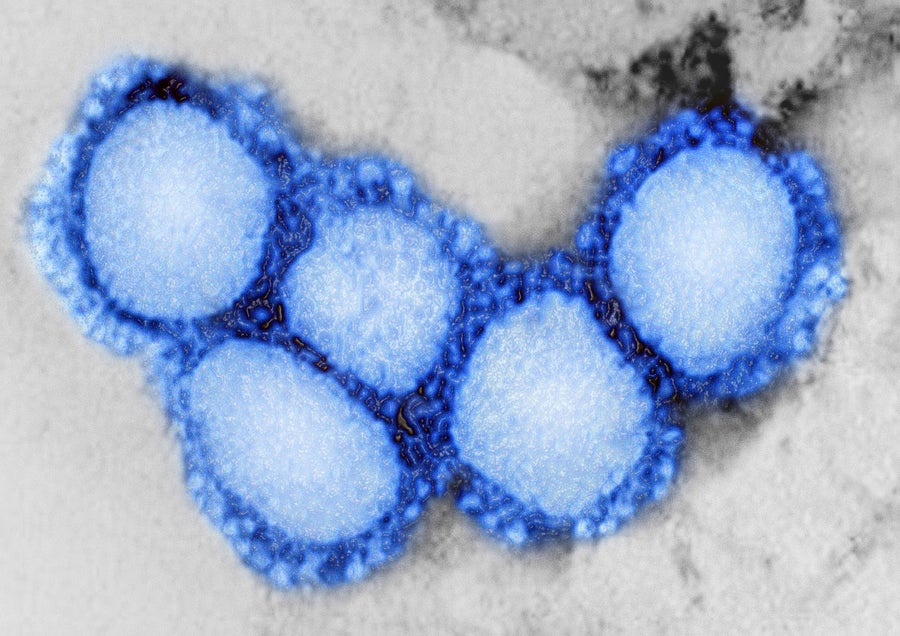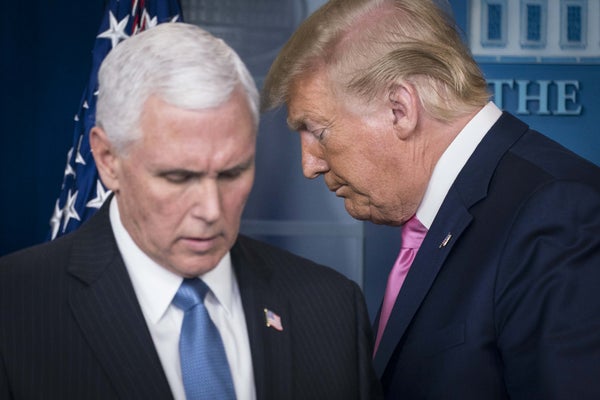President Trump on Wednesday said he had appointed Vice President Mike Pence to lead the federal government’s response to the novel coronavirus outbreak that has claimed more than 2,400 lives globally and spread to about three dozen countries in recent weeks, shaking global markets and alarming world leaders.
Trump’s decision to elevate Pence comes after days of debate over whether the administration should appoint a coronavirus “czar.” Health secretary Alex Azar had previously led the effort, and insisted in a congressional hearing earlier Wednesday that appointing another leader was unnecessary.
“As a former governor from the state where the first MERS case emerged in 2014,” Pence said at a White House press briefing Wednesday evening, “I know full well the importance of presidential leadership, the importance of administration leadership, and the vital role of partnerships of state and local governments, and health authorities in responding to potential threats and dangers infectious diseases.”
On supporting science journalism
If you're enjoying this article, consider supporting our award-winning journalism by subscribing. By purchasing a subscription you are helping to ensure the future of impactful stories about the discoveries and ideas shaping our world today.
Pence, however, has been sharply criticized for his response to public health crises during his time as Indiana governor. Most notably, Pence opposed public health officials’ calls to implement syringe exchange programs in Indiana in 2015, when the opioid crisis led to clustered outbreaks of HIV and hepatitis C. After months, he relented.
Trump cast the press conference as an effort to reassure the public that his administration is “very, very ready for an outbreak.” His tone stood in contrast to a Tuesday speech from Nancy Messonnier, director of Centers for Disease Control and Prevention’s National Center for Immunization and Respiratory Diseases, in which she urged American citizens and companies to prepare for a much broader outbreak. “Disruption to everyday life might be severe,” she said.
So far, Trump said, public health officials have documented 15 U.S. coronavirus cases, mostly from Americans who had recently returned from travel in China. An additional 45 Americans who have tested positive for the coronavirus have been repatriated from foreign soil—42 from a cruise ship and three from Wuhan, the Chinese city in which the outbreak originated.

Coronavirus. Credit: Getty Images
“Our containment strategy has been working,” Azar said. “At the same time, what every one of our experts and leaders have been saying for more than a month now remains true. The degree of risk has the potential to change quickly, and we can expect to see more cases in the United States.”
Trump, during the press briefing, defended his decision to close U.S. borders to individuals who had recently set foot in China—a move that some public health officials had warned against.
“Because of all we’ve done, the risk to the American people remains very low,” Trump said.
The White House officials had barely ended their briefing, however, when the CDC announced a new case in California that could represent a new milestone in the outbreak: the first individual to contract the disease in the U.S. without having recently traveled to impacted areas or having contact with individuals known to be infected.
“It’s possible this could be an instance of community spread of COVID-19, which would be the first time this has happened in the United States,” the agency said in a statement. “Community spread means spread of an illness for which the source of infection is unknown. It’s also possible, however, that the patient may have been exposed to a returned traveler who was infected.”
Public health officials led by Anthony Fauci, the director of the National Institute of Allergy and Infectious Disease, also announced at the White House briefing that the had revised its timeline for entering a vaccine candidate into initial clinical trials, which could come within two months—instead of three, as Fauci had previously predicted.
But Fauci stressed that a vaccine will not be available in the near future, and that it would likely be useful only if the Covid-19 outbreak returns in a year’s time.
Trump also peppered a series of head-scratching claims throughout the press conference. At one point, he admitted he was “shocked” to learn the fatality rate of the flu, which has been among the leading causes of death in the United States for decades.
“I think most people are amazed to hear it,” Trump said. “The flu kills from 25,000 people to 69,000 people a year. That was shocking to me.”
Later, in comparing the coronavirus outbreak with the West African Ebola outbreak of 2014-2016, Trump claimed that people who contract Ebola “disintegrate.”
Republished with permission from STAT. This article originally appeared on February 26 2020
Read more about the coronavirus outbreak here.
